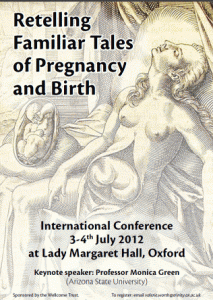This conference brings together leading specialists from a range of the medical humanities to explore the trope of the retelling of stories about pregnancy and birth. Taking a very broad geographic and chronological focus, our objective is to encourage innovative interdisciplinary exchanges by addressing the following questions:
How did/do methods of diffusion (print culture, images, drama, ultrasound and modern medical technologies) encourage the retelling of familiar birthing tales, and how were/are new ones added?
Why did/do some stories of pregnancy and birth circulate more widely than others?
When stories are retold, which details of the original are always retained, which are lost in the retelling, and how and why do new accretions creep into the story?
Papers by some twenty researchers, from humanities, social sciences and health care, will be given over the two days, with generous time allowed for audience discussion and questions. We are grateful to the Wellcome Trust for a grant subsidising the conference.
Janette Allotey (Manchester), Helen King (Open University) Valerie Worth (Oxford)
Provisional programmeas (6/6/12)
Day 1:
11-12.15
Opening session: organisers’ introduction
Sharon Aviva Jones (Applied Drama, Goldsmith’s, London), ‘The Performance of Childbirth: Birth Stories and Rites of Passage in the UK today’
Lisa Hinton (Health Experiences Research Group, Oxford), ‘Healthtalkonline and stories of birth’
12.15 lunch
14.00 Birth in fiction
Véronique Duché (Languages and Literatures, Melbourne), ‘The birth of/in French fiction (16th Century)’
Charlotte Woodford (German, Cambridge), ‘Feminist re-tellings of pregnancy and birth experiences in fin de siècle Germany’
Giulia Zanini (Political and Social Sciences, Fiesole, Italy – PhD) ‘“The most beautiful thing that I remember about my childhood is the story of my birth”. Italian intended parents of donor-conceived children and the creation of family histories and fairy tales’
15.30 teabreak
16.00 Telling tales under God
Rebecca Johnson (History, Princeton, US – PhD), ‘Dolores spatio quatuor dierum: Approaching Childbirth in Medieval Catalonia through a Miracle Attributed to Ramon de Peñafort’
Vina Vaswani (Director, Centre for Ethics, Yenepoya University, Mangalore, India), ‘Reinforcing values in the birth of a baby through mythological/folk tales’
17.00 Keynote, Monica Green (History, Arizona), “The Travels of Muscio: Making Medieval Obstetrics out of a Late Ancient Text”
Day 2:
9.30 The father’s tale
Holly Tucker (French and Italian/History of Medicine, Vanderbilt University, US), ‘Pregnant Men?: Stories of Atypical Reproduction in Early Europe’
Angela Davis and Laura King (History, Warwick), ‘Figure of Fun to Birthing Partner? Childbirth stories of and by fathers in post-war Britain’
11.15 coffee
11.30 Unusual births or mothers
Theresa Earenfight (History, Seattle), ‘Narratives of Regal Maternity in Late Medieval and Early Modern Spain’
12.00 Midwives’ responses
Round table discussion
12.30 lunch
14.00 Powerful stories
The eighth-month-child: Lesley Bolton (Classics, Calgary), ‘The eighth-month child: Recasting an old medics’ tale: transmission and transformation of theories on inauspicious periods of gestation’
The wandering womb: Alison Klairmont Lingo (History, University of California, Berkeley) and Stephanie O’Hara (French/Women’s and Gender Studies) University of Massachusetts Dartmouth), ‘Capturing the Wandering Womb in the Early Modern Era: Louise Bourgeois and The Compleat Midwifes Practice’
15.15 tea
15.45 Tales from the experts
The gynaecologist: Ramona A. Braun (History and Philosophy of Science, Cambridge), ‘Against the timebomb: Laparoscopic treatment of the ‘disease’ of ectopic pregnancy in gynaecologists’ accounts of the 1950s’
The German ‘family midwife’: Jennifer Jaque-Rodney (International Delegate –
German Association of Midwives), ‘Family midwifery. Health promotion through bonding for mother and child’
The doula: Holly Hendry and Dr Salma Siddique (Life, Sport and Social Sciences, Edinburgh Napier) ‘Stories retold in the spaces between pregnancy and childbirth’
17.30 Midwives’ panel and general discussion
Practical details
1) Dates and venue:
The conference will take place in Lady Margaret Hall, one of the colleges of Oxford University, on 3rd and 4th July 2012. Oxford is easily accessible by train or coach, and it is a 20-minute walk from the station to Lady Margaret Hall (or a short taxi ride). ). If you are arriving at Heathrow, there are regular buses to Oxford (Gloucester Green is the terminal you need in the city centre). If you are arriving by car, we recommend you park in one of the city’s ‘park and ride’ car parks, as parking in the city centre is extremely limited!
2) Accommodation
The conference organisers are able to provide accommodation (in single rooms) for those giving papers at one of the north Oxford properties belonging to Trinity College. Other delegates might wish to use the website of rooms available at Oxford colleges to make their own accommodation bookings: http://www.oxfordrooms.co.uk/. Alternatively, information on hotels is available on Oxford city’s tourist website.
3) Registration:
To register for the conference, please book completing the booking form and emailing it back to valerie.worth@mod-langs.ox.ac.uk by Friday 8th June 2012. Please note that the number of delegates attending is limited, so early booking is advised.
Payment should be made either by cheque (made payable to Trinity College Oxford), drawn on a UK bank, or by debit or credit card (charges to be handled by Trinity College Oxford). Once bookings have closed, you will be sent an email asking you to pay the total due for all bookings by Monday 19th June.


